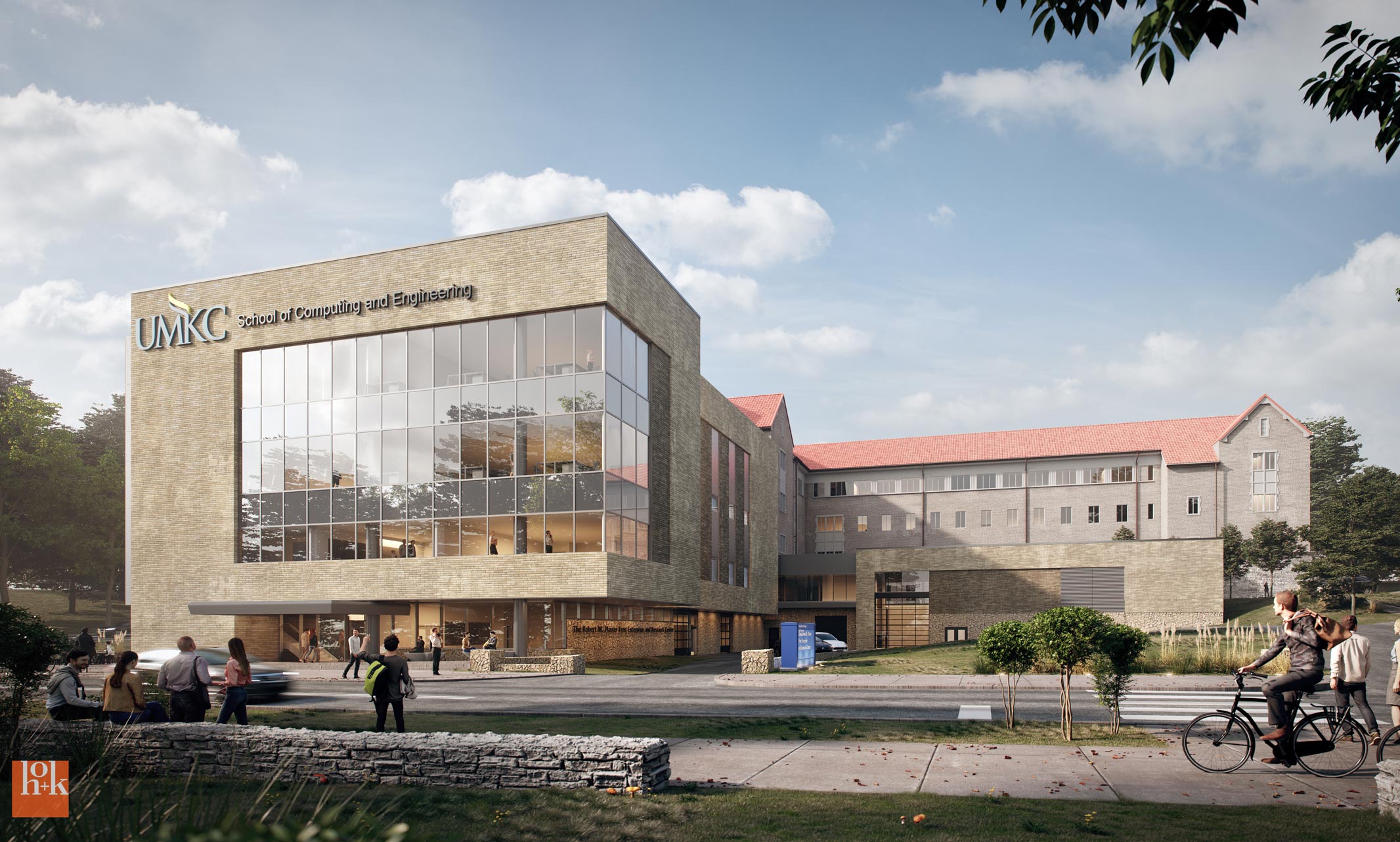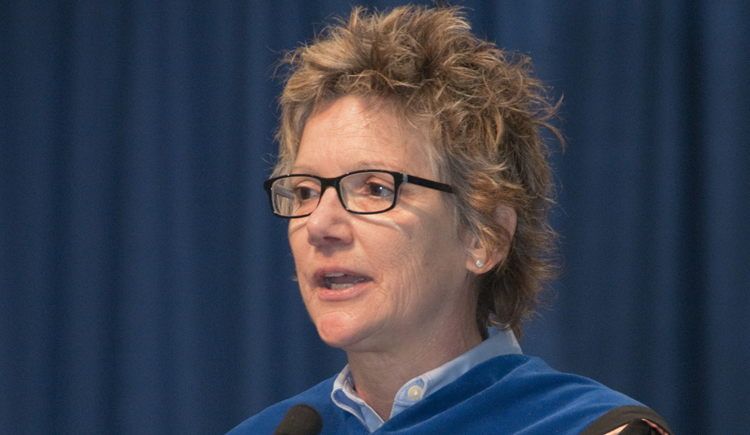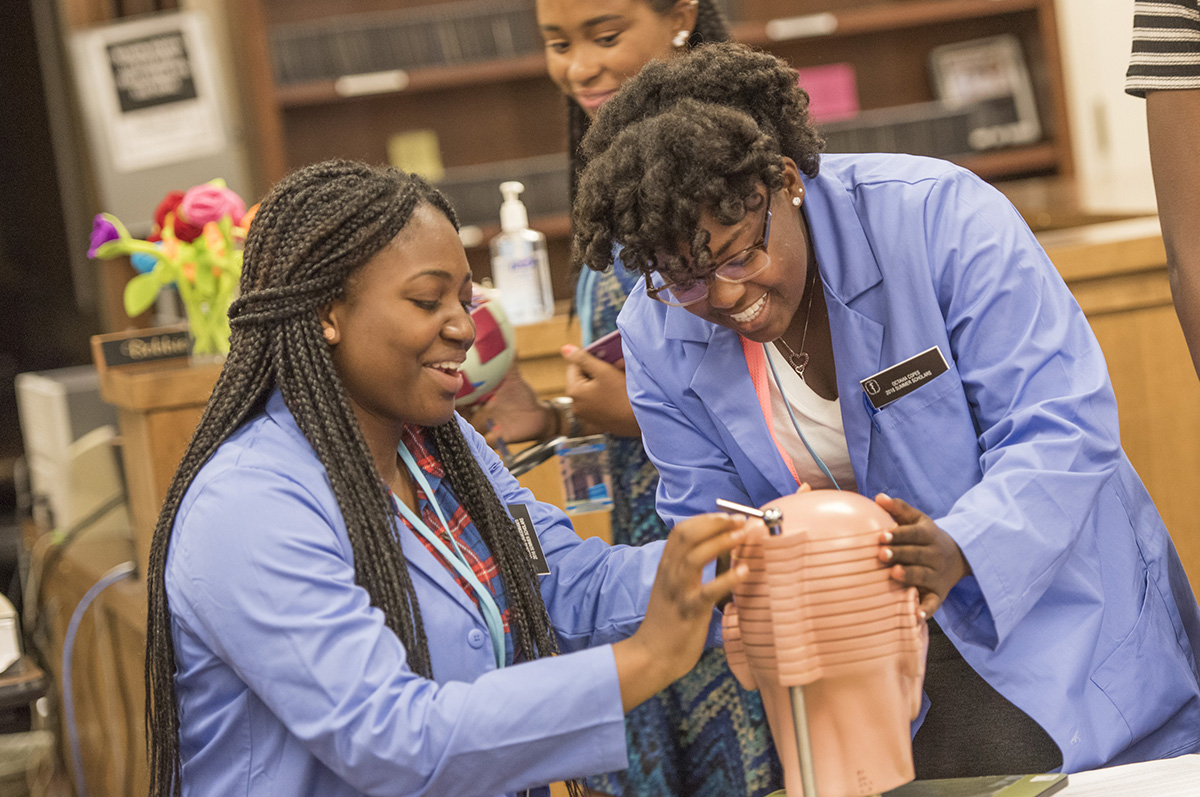
Building will offer new computing and engineering opportunities
Students flew drones above and demonstrated robotics around steel bridges and racing buggies outside of the University of Missouri-Kansas City Student Union Theater. These prize-winning innovations gave guests just a glimpse of the talent that comes out of the UMKC School of Computing and Engineering as they filed into the theater to celebrate the long-awaited groundbreaking Sept. 20 of the school’s new research and laboratory building.
The name of the new $32 million building was revealed at the event: The Robert W. Plaster Free Enterprise and Research Center.
The 57,800-square-foot building will provide leading-edge, high-tech research and development capabilities for both the campus and the Kansas City community at large. As home to the campus’ Free Enterprise Center, a maker space with industry grade equipment available for anyone to use, this building will serve a much broader audience than just the UMKC community when it opens in 2020.
“The efforts of our faculty and staff – under the leadership of Dean Kevin Truman – have led to a rapid increase in student enrollment over the past 10 years at the School of Computing and Engineering," says UMKC Chancellor C. Mauli Agrawal. "The new education and research center will increase both classroom space and faculty research capabilities for the school, both of which play a key role in maintaining and enhancing Kansas City and Missouri’s ability to compete in a high-tech 21st century global economy.”
Switching up from the traditional dirt-and-shovel groundbreaking events, and directly in line with UMKC’s leadership in drone technology, Agrawal and School of Computing and Engineering Dean Kevin Z. Truman led the audience through a virtual groundbreaking experience and multimedia visual of the building.
“This building gives us the ability to perform world-class research in fields such as nanomaterials, unpiloted aircraft, renewable energy, and Big Data," Truman says. "Our students will be thrilled to continue their in-depth participation in scholarly research, now taking place in a new, modern, enhanced facility.”
High-tech capabilities in the Robert W. Plaster Free Enterprise and Research Center will include:
$3 million worth of new virtual reality and augmented reality equipment
A clean room and scanning electron microscope, which can allow for the development of nanotechnology, robotics, biomedical applications, mechatronics and other technologies
Research-grade 3-D printing equipment
A high-bay structural lab that will power research and development for, and prepare the workforce for, Kansas City’s large and growing civil engineering and construction sector
“Big data” analytics labs that will replicate major data centers, preparing students for jobs at local tech firms such as Cerner and Garmin as well as major national and international employers such as Google, Microsoft and Facebook
An energy learning and research facility that will address topics ranging from renewable energy and traditional high-voltage transmission to the creation of batteries small enough to power tiny monitors being used in medical research and healthcare.
Though only a freshman, Ruby Rios’ relationship with the UMKC School of Computing and Engineering extends back to her middle school days when she first became involved with the UMKC School of Computing and Engineering-founded KC STEM Alliance. Rios said it was her involvement with KC STEM Alliance that sparked her interest in connecting more with the Kansas City tech community. Attending UMKC was a natural fit for her as she’d already spent time on campus, and Flarsheim Hall – the current home of the School of Computing and Engineering – through various summer programs and tech camps for girls.
“Today, I feel very fortunate that I’m able to return to Flarsheim Hall as a Computer Science freshman," Rios says. "I think the new building represents how seriously UMKC is taking its role as a leader in STEM education in our region. I’m excited to see that the School of Computing and Engineering is growing right alongside the rest of our tech community.”
Though many of the attendees there to celebrate the groundbreaking each came with a unique perspective, the shared excitement among them was that the future of STEM research and education is as bright as ever.
“As one of the first corporate supporters of this project, I couldn’t be prouder," says Greg Graves, retired CEO of Burns & McDonnell. "And as one of the first personal supporters of this project, I’m even happier. What you will do here will move your students forward, it will move Kansas City forward.”
Construction of the Robert W. Plaster Free Enterprise and Research Center will begin immediately. The technical consultant team on the project is PGAV Architects, Odimo, Branch Pattern, KH Engineering Group and SK Design. The design-build team is Whiting-Turner Contracting Company, HOK, Ross & Baruzzini, Antella Engineering Consultants, Alper Audi Inc., Taliaferro and Browne Inc. and Colin Gordon Associates.
The UMKC School of Computing and Engineering recognized major donors to the building project:
The Sunderland Foundation
The Robert W. Plaster Foundation
The Ewing Marion Kauffman Foundation
The Hall Family Foundation
The Illig Family Foundation
SS&C – formerly DST Systems
The Economic Development Administration
The Jack and Glenna Wiley Foundation
The National Science Foundation
KCP&L
Black & Veatch
Burns & McDonnell
Paul DeBruce
The building is named for Robert W. Plaster of the Robert W. Plaster Foundation. Plaster was a successful Missouri businessman as well as a co-founder and active supporter of Enactus, at that time known as Students in Free Enterprise, and was a member of its executive board until the time of his death in 2008.
Sep 20, 2018

Mary C. Daly (B.A. ’85) is second alum to take helm of Fed bank
After more than 20 years at the Federal Reserve Bank of San Francisco, UMKC alumna Mary C. Daly has risen through the ranks to become president and CEO.
Daly’s appointment makes her the second UMKC alumna to be leading one of the Federal Reserve’s 12 regional banks—she joins Esther George (EMBA ’00), president and CEO of the Federal Reserve Bank of Kansas City, who has held that role since 2011.
Alex Mehran, chairman of the Board of Directors for the Federal Reserve Bank of San Francisco and chairman of the Board’s presidential search committee, praised Daly’s depth of knowledge.
“In addition to her profound knowledge of economics and monetary policy, Mary is one of our nation’s leading authorities on labor market dynamics,” Mehran said. “Her research in this area reflects her deep commitment to understanding the impacts of monetary and fiscal policy on communities and businesses at a local, regional and national level.”
Daly joined the San Francisco Fed in 1996 as a research economist and has served as executive vice president and director of research since 2017. Daly has also strived to equalize the hiring between male and female research assistants at the San Francisco Fed, working to balance what she deems a “diversity crisis” in the industry.
“I believe very strongly in the Federal Reserve’s mission and in the important role we play in helping to create strong, stable economic conditions in all corners of the country that allow individuals and businesses to prosper,” said Daly.
As noted in a report by the New York Times, Daly dropped out of high school and later earned her general education diploma before enrolling at UMKC. She received her bachelor’s degree in economics from UMKC’s College of Arts and Sciences, followed by a master’s degree from the University of Illinois Urbana-Champaign and Ph.D. from Syracuse University.
Both George and Daly have been recognized as outstanding alumni by the UMKC Alumni Association. George was honored as UMKC Alumna of the Year in 2017. Daly was cited as the association’s Defying the Odds Award winner in 2013.
The Federal Reserve System is the central bank of the United States and is charged with promoting the effective operation of the U.S. economy and, more generally, the public interest.
“I believe very strongly in the Federal Reserve’s mission and in the important role we play in helping to create strong, stable economic conditions in all corners of the country that allow individuals and businesses to prosper.”- Mary C. Daly (B.A. ’85)
Three of the 12 Federal Reserve Bank presidents have degrees from Harvard. In addition to UMKC, universities with two alumni among the bank presidents are Stanford, the University of Illinois and the University of Pennsylvania.
George, a national leader in domestic monetary policy, joined the Federal Reserve of Kansas City in 1982 and spent much of her career in the Division of Supervision and Risk Management. Prior to her appointment as president and CEO, she had served as chief operating officer since 2009.
George has participated in the Bank for International Settlement’s Financial Stability Institute programs in Lima, Abu Dhabi, Beijing and Malaysia. She is currently a UMKC Trustee and a member of the Ewing Marion Kauffman Foundation’s Board of Trustees.
Sep 17, 2018
Part of $260 million in investments for strategic priorities over the next five years
It’s not “business as usual” at the University of Missouri System.
During the past two years, university leaders have reallocated millions of dollars to make a college education at the system’s four universities affordable and accessible to Missourians. As a result, student enrollment is up, retention is high and spending on research is growing.
In his speech, “Excellence Through Innovation: A New University of Missouri System,” Choi announced $260 million in investments for strategic priorities over the next five years, including $100 million in new scholarships and $50 million to support research and creative works.
Choi singled out two innovative UMKC programs for investments to drive system-wide and statewide expansion.
The System will invest $1.25 million to support the expansion of KCSourceLink, an innovative entrepreneurship support program developed by the UMKC Innovation Center. The investment will expand the program to MOSourceLink with the partnership of the Missouri Technology Corporation. MOSourceLink will connect small businesses and startups in the state with resources to achieve success.
A $250,000 investment will expand UMKC-based American Public Square to partnership with all four System campuses. The new partnership will provide opportunities to bring non-like-minded individuals together at the four universities for fact-based, civil conversations about important issues.
Additionally, he declared that the UM System will focus on innovation, collaboration and transformative actions to grow its stature.
“By cutting and reallocating more than $180 million over the past two fiscal years, we have stated emphatically that the University of Missouri is making bold changes to achieve excellence,” Choi said. “While many of the changes were painful, they were necessary to create a more resilient university. It’s now time to make meaningful investments to achieve excellence. We will take actions that put Missourians first and invest only in areas that support our new vision for the university. We will be more innovative in all we do and break away from traditions that impede excellence.”
The one-time money provided by the UM System — with the expectation of matches from each university — will be used to invest in students, faculty and staff through the universities’ strategic plans, including:
$100 million for scholarships — $75 million will be used for “Promise & Opportunity Scholarships” based on need, and $25 million will be used for “Next Generation Merit Scholarships” to recruit academically outstanding Missouri students to the four universities.
$50 million for the Precision Medicine Initiative and the Translational Precision Medicine Complex — this initiative will provide UM researchers with the latest technology as they seek answers to complex medical questions.
$50 million for research and creative works — university leaders hope this infusion of funds will spur collaborative, multi-investigator proposals that lead to more external research funding.
$20 million for digital learning initiatives — this effort will grow online and distance-learning opportunities, reduce the cost of traditional education and increase the number of online degrees granted.
$12 million for Missouri Compact Distinguished Professorships — this initiative will help university leaders attract members of the National Academies who will significantly increase scholarly and research output.
$10 million for engagement — these funds will support a systemwide program encouraging additional industry partnerships.
$8.5 million for inclusive excellence — this will support recruitment and retention of faculty and staff from diverse backgrounds, experiences and perspectives.
$7.5 million for faculty and staff success — these funds will be invested in faculty and staff to improve university culture, establish effective orientation programs for new employees and develop strong professional development programs.
The full list of investments can be found online at http://umurl.us/stratinv. Proposals for the funds will be evaluated this fall, and Choi, the four chancellors and senior officers of the university will make final selections. All funding requests and plans should demonstrate a path to financial viability for mission-centric projects and a positive return on investment to achieve excellence, increase revenue generation and reduce costs.
“Through administrative changes at the UM System and good financial management of our investments, we are able to reallocate these funds and focus them on the needs of our students, faculty and staff, directly supporting our teaching and research missions and the Missouri Compacts,” said Ryan Rapp, vice president for finance.
Also in his address, Choi announced:
The launch of Missouri Intern Connect, in partnership with the Missouri Chamber of Commerce and Industry with support from the Missouri Small Business & Technology Development Centers, to create opportunities for students to connect with internship opportunities across the state.
The appointment of Bill Turpin, CEO of the Missouri Innovation Center, to lead economic development efforts for MU and the UM System.
The launch of the EQ Student Accelerator to support entrepreneurially minded students systemwide.
The UM System Buy Missouri program to better support Missouri businesses through UM System procurement processes and spending.
The appointment of UMSL CFO Rick Baniak as UM System Chief Transformation Officer to lead the efforts of modernizing administrative functions systemwide.
A five-year plan to increase salaries for faculty and staff.
“We want our universities to be a place where our faculty and staff are proud to work, our students are proud to attend, civic leaders and communities are proud to support, and business are proud to partner,” Choi said. “We will become a stronger UM System driven by innovation and hard work.”
Sep 14, 2018

$3.2 million grant will go to mentoring tomorrow’s doctors, dentists and pharmacists
The U.S. Health Resources & Services Administration has awarded a five-year, $3.2 million grant to the University of Missouri-Kansas City School of Medicine to prepare students from educationally and economically disadvantaged backgrounds for health professional careers. The UMKC schools of Dentistry and Pharmacy also are partners on this initiative.
The grant will go to expand summer programs for high school and college students, and it will go to a mentorship program for UMKC undergraduate and graduate students who are pursuing health professional degrees.
“Historically, students from educationally or economically disadvantaged backgrounds experience greater challenges with regards to persisting in college and entering health care fields,” said Alice Arredondo, director of UMKC admissions and co-investigator on the grant along with Nate Thomas, associate dean of diversity and inclusion at the school.
“This grant will allow us to support students in overcoming academic, economic and social barriers, while having an impact on the diversity in our educational environment and the success of disadvantaged students in the UMKC health sciences. By providing students early access to hands-on programming and mentoring, we hope to prepare students to achieve success in college and, eventually, graduate or professional school and the workforce.”
The grant funding begins Sept. 1. Each year, 32 to 36 students — including UMKC undergraduates — will be mentored by faculty members, practitioners and other students. The first summer program will be in 2019, expanding the program from two to six weeks. These are part of the Students in Training, in Academia, Health and Research (STAHR) Partnership.
“This partnership will allow us to help students develop academically, psychosocially, professionally and as leaders who can have a positive impact on the workforce and their communities,” Thomas said.
The UMKC School of Nursing and Health Studies — a partner in an innovative educational team approach called interprofessional education with the UMKC schools of Dentistry, Medicine and Pharmacy — offers similar federal-grant funded programming for high school and college students. One includes KC HealthTracks, offering mentorship and programs for more than a dozen area high schools.
Sep 04, 2018
